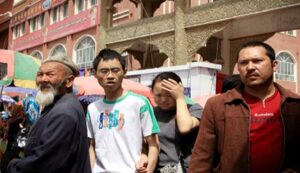New details emerge about Cambodia’s torture of 20 Uyghur refugees fifteen years ago
China: According to sources cited by Radio Free Asia, 15 years ago, Cambodia sent 20 Uyghur asylum seekers back to China, where they were imprisoned and tortured and suffered grave human rights violations. One later-released lady said that the abuse, which included being kept almost nude in a chilly jail cell and receiving electric shocks, caused her to miscarry. A very sick guy who was given a 20-year sentence was also made to work in jail.

According to Radio Free Asia, the Uyghurs had left China’s Xinjiang province after deadly riots between Muslim Uyghurs and Han Chinese in Urumqi in July 2009, which resulted in heightened surveillance and large detentions in so-called “re-education” camps starting in 2017.
Nevertheless, despite strong worldwide outrage, the Cambodian government sent them back to China under pressure from Beijing. On December 24, 2010, the Chinese authorities staged a secret trial in Kashgar after they returned to Xinjiang and sentenced them to jail.
Ayshemgul Omer, a relative of one of the prisoners, has provided RFA with horrifying information about the plight of the deported Uyghurs, which were rarely known until recently.
When the 20 Uyghurs first arrived in Cambodia, they were given temporary shelter while they awaited relocation to a third nation. After leaving China, Omer remained in contact with the families of the deported Uyghurs in Xinjiang, where he had previously interacted with them before moving to Turkey in 2014.
According to Omer, her relative Memettursun Omer is incarcerated for 20 years at Turpan Prefecture’s Daheyan Prison and is compelled to work despite having a chronic illness. He has hyperthyroidism, or Grave’s disease, which manifests as bulging eyes, shaking hands, joint discomfort, and incessant hunger. Due to budgetary limitations, Omer’s family was unable to provide him his medicine, despite some help from jail officials.
According to Ayshemgul Omer, Shahide Kurban, one of the deported women, miscarried as a result of the cruel treatment she received. The only deportees known to have been freed from jail are Kurban, who was pregnant when she was deported, and her two children. Kurban detailed the torture she endured, including electric shocks during her first six months in custody, and the mistreatment she endured, such as being kept in a very cold room for 48 hours while just wearing her underwear. She was sent to Aksu and Kashgar for more interrogation after being questioned in Urumqi, where she miscarried.
Omer verified that Kurban and her children were freed under favorable circumstances, despite China’s assertions to the contrary. However, he also said that other Uyghurs, including the interpreter for the refugees, Akber Tuniyaz, received jail terms, though it was unknown how long they would remain there. Omer said that a number of deported Uyghurs had different health problems, and two of them, namely Memet Eli Rozi, perished in jail. Mutellip Mamut was one of four Uyghurs who were given life sentences; the other Uyghurs were given terms ranging from 16 to 20 years.
Despite strong worldwide condemnation and worries about the safety of the refugees, Beijing ordered the Uyghurs to be deported on December 19, 2009.
Citing the principle of non-refoulement, which forbids sending people back to nations where they would be subjected to torture or persecution, the United States and the United Nations asked Cambodia not to deport the Uyghurs. Chinese Vice President Xi Jinping inked grant and credit deals with Cambodia totaling over US$1.2 billion two days after the deportations. Government spokesperson Khieu Kanharith said, “China has thanked the government of Cambodia for assisting in sending back these people.” Cambodian authorities also expressed thanks for China’s cooperation. These individuals are considered criminals under Chinese law.
The United States placed sanctions on Cambodia as a result of its activities, stopping the country’s import of 200 surplus military vehicles. Nearly 70 international human rights groups demanded openness and fair hearings for the 20 Uyghur deportees, while the United States, Turkey, Japan, and the European Union denounced the deportation.





